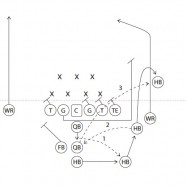
In the pool, around the track, across the courts, and on slopes and fields, student athletes strive to perform at their best. While their coaches constantly guide and teach, team captains significantly affect the experiences in an athlete’s season. Elected by peers to lead, team captains are typically seniors who bring their experience from previous seasons. Most teams have two or three captains, and occasionally a well-respected player from Class II or III gets the nod of teammates. Each team has unique needs, but the roles that team captains play are similar, regardless of the sport.
“Having individual goals is important, but the team captain needs to put the team goals ahead of individual goals,” says Samantha Clifford (I), captain of girls’ volleyball and girls’ basketball.
Nick Bland (I) agrees. Nick is a three-season athlete and a team captain for boys’ football, basketball and lacrosse—the only student in the class serving as captain on three teams.
“A good captain is able to lead a group of individuals to a goal that is greater than themselves,” says Nick. “Captains need to be more than just players on the team, they need to be leaders both on and off the field.”
Captains do recognize that their role extends beyond practices, races and games.
“It’s important for captains to be leaders not just on the court, but in the Student Center, or even walking around campus. We need to set a good example,” says Tucker Hamlin (I), a boys’ squash captain for the second year.

Senior captains Samantha Clifford (volleyball, basketball), Jessica Li (soccer), Nick Bland (football, basketball, lacrosse), Kasia Ifill (track), Ben Bosworth (cross country, track) and Tucker Hamlin (squash)
Lamar Reddicks, Milton’s athletic director and boys’ basketball coach, instituted a captains’ program at the beginning of the school year to review, or in some cases introduce, the idea of personal leadership to the captains. They attended a session run by Positive Coaching Alliance, a national nonprofit that works with youth and high school athletes. The students also read Elevating Your Game: Becoming a Triple-Impact Competitorby Jim Thompson.
“Giving our captains an idea of what leadership is benefits them, and the School, in so many ways,” says Coach Reddicks. “The students learn skills that they can carry with them throughout their lives.”
Team captains routinely set the tone and rally the athletes, too.
“Captains set the team dynamic at the beginning of the season,” says Jessica Li (I), a girls’ soccer captain. “We want everyone to feel a part of the team, even when we aren’t on the field.”
“Even though practices and meets can be tough, you keep your head up to show your teammates that even though things can sometimes be difficult, you still have to try your best,” says Kasia Ifill (I), a track team captain.
Motivating your peers is a difficult skill to master, and many captains say this responsibility is a challenge.
“Getting teammates excited about the season is one of the most important things captains do,” says Kevin MacDonald, coach of the boys’ football team, “whether that means getting the athletes into the weight room or out for runs. They need the skills in organization and motivation. Captains need to be vocal, too—not afraid to speak up when necessary.”
“Players get tired sometimes; some may not want to go to practice after a long day at school,” says Jessica. “But the captain can overcome those things by keeping the enthusiasm up. If you are excited, your teammates will pick up on that.”
“When we are joking around and having fun, the captains have to know when it’s time to step in and say, ‘Let’s focus.’ You don’t want to be the bad guy, but at some point you have to encourage your teammates to shift gears,” says Tucker.
Personality conflicts or strong disagreements between players can arise, and they can be serious.
“As a captain, you deal with situations both on and off the field,” says Nick. “Your teammates all have different personalities, and sometimes they make decisions that are tough to confront. Being the bigger person and looking at a situation from everyone’s perspective is what you need to do. Then you can decide how best to help them and move forward as a team,” says Nick.
Overall, all the captains relish keeping the atmosphere fun, whether continuing long-held traditions, organizing team dinners, decorating underclassmen’s lockers, or trading inside jokes.
“I like to have fun with the girls,” says Kasia. “We lead the team parties, the cheers, the stretches and warm-ups. In the beginning of the season, we meet to talk about the season’s goals and inform the younger girls about track and how the team can both work hard and have fun.”
Ben Bosworth (I), a seasoned team captain of boys’ cross country and track, enjoys leading an old cross country tradition: running around campus with a shopping cart and boom box the Friday before a race. As the music plays, the runners perform various musical acts and skits outside of the Student Center. It’s a silly and fun way for the runners to bond.
All of the captains remember how they felt in Class IV. They go out of their way to reach out to the new and younger members of the team. Nick points to the chance to establish relationships with younger students who might not normally interact with upperclassmen on a daily basis.
Ben says, “When I was a freshman, I looked up to the seniors and captains. To me, they were the coolest people around. I could tell they’d been through so many experiences. Now it’s my turn to create a positive environment; we work hard to make the youngest runners feel part of the team quickly at the beginning of the season.”
“I like being there for younger students if they have questions or concerns,” says Samantha. “Being looked up to is nice. Overall, my role on the team hasn’t changed too much now that I’m captain. I’ve always been enthusiastic and loud, cheering on my teammates. The only thing that has changed is that people now come to me with concerns.”
Although they might not connect daily, team captains are also there for each other.
“I like being surrounded by classmates who hold similar positions,” says Nick, “to see how they’re working with their teams and helping each other through difficult situations.”
— Liz Matson



